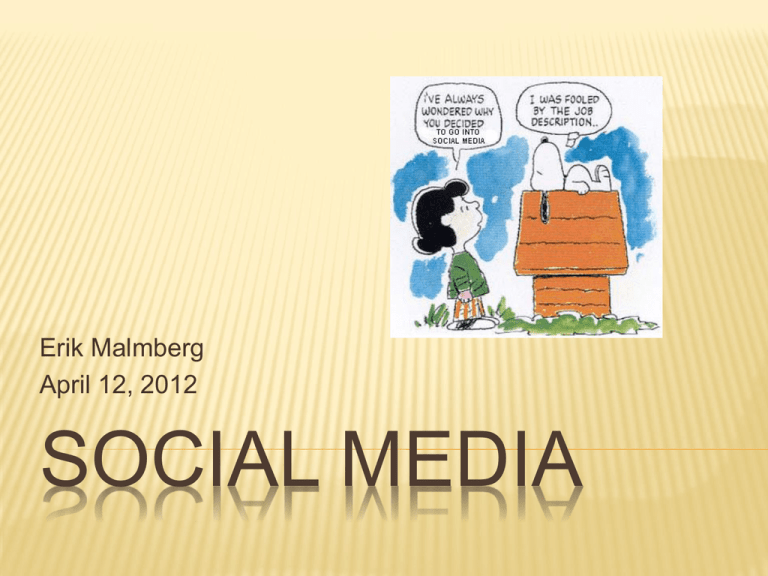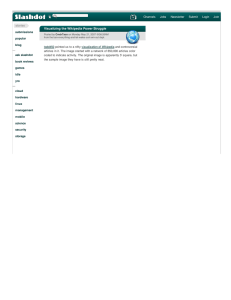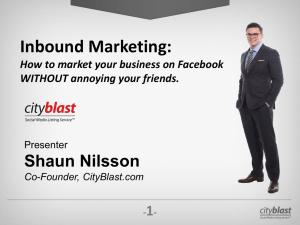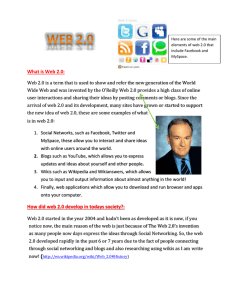SocialMedia.pptx
advertisement

Erik Malmberg April 12, 2012 SOCIAL MEDIA DEFINITIONS: SOCIAL MEDIA Social media includes web-based and mobile technologies used to turn communication into interactive dialogue. Andreas Kaplan and Michael Haenlein define social media as "a group of Internet-based applications that build on the ideological and technological foundations of Web 2.0, and that allow the creation and exchange of user-generated content.“ Social media is the media for social interaction as a super-set beyond social communication. (Wikipedia) The best way to define social media is to break it down. Media is an instrument on communication, like a newspaper or a radio, so social media would be a social instrument of communication. Think of regular media as a one-way street where you can read a newspaper or listen to a report on television, but you have very limited ability to give your thoughts on the matter. Social media, on the other hand, is a twoway street that gives you the ability to communicate too. (About.com) DEFINITIONS: WEB 2.0 AND UGC Web 2.0 is a term that was first used in 2004 to describe a new way in which software developers and end-users started to utilize the World Wide Web; that is, as a platform whereby content and applications are no longer created and published by individuals, but instead are continuously modified by all users in a participatory and collaborative fashion. (Kaplan and Haenlein, 2010) User-Generated Content is the production of content by the general public rather than by paid professionals and experts in the field. Also called "peer production," and mostly available on the Web via blogs and wikis, user-generated content refers to material such as the daily news, encyclopedias and other references, movie and product reviews as well as articles on any subject, all of which have been traditionally written by editors, journalists and academics. It is one of the hallmark features that distinguishes Web 2.0. (PCMAG.COM) OKAY WHAT ARE WE REALLY TALKING ABOUT? Keith Burtis - Bloggers Lounge at SXSW 2010 SOCIAL MEDIA: THE TECHNOLOGY There has been rapid growth in the number of US patent applications that cover new technologies related to social media…There are now over 250 published applications. (Wikipedia) Magazines Internet forums Weblogs Social blogs Microblogging Wikis Podcasts Photographs or pictures Video Vblogs Rating and social bookmarking THE SOCIAL MEDIA LANDSCAPE… Blogging and Micro-Blogging. (Twitter, Tumblr) Social Networking. (Facebook, Google+, LinkedIn) Content Communities. (YouTube, Flickr) Collaborative Projects. (Wikipedia, Wikia) Social Bookmarking. (Del.icio.us, Blinklist, Simpy) Social News. (Digg, Reddit) Virtual Worlds. (Second Life, World of Warcraft) The possibilities may be endless. (Wikipedia List of Major Social Network Sites) CLASSIFICATION OF SOCIAL MEDIA Social Presence/Media Richness Self Presentation/ Self Disclosure Low High Blogs Social networking sites (e.g., Facebook) Collaborative projects (e.g., Wikipedia) Content Virtual game communities (e.g., worlds (e.g., World YouTube) of Warcraft High Low Medium (Kaplan and Haenlein, 2010) Virtual social worlds (e.g., Second Life) SOCIAL MEDIA’S CONNECTION TO INFORMATION ARCHITECTURE? From the back cover of our text: “The post-Ajaxian Web 2.0 world of wikis, folksonomies, and mashups makes well-planned information architecture even more essential.” This is not your parent’s (or even your older siblings) information technology. Applying the principles of IA to social media can help create online environments engaged in the exchange of information and building of community sell the need for it to those within an organization including tangible benefits such as return on investment BENEFITS Low cost Unlimited access Simplicity Global reach Contact building Flexibility Measurability CHALLENGES AND CRITICISMS The Amateur Rules! Information Overload Are a person’s social media sites, such as Facebook and Twitter, something an employer or potential employer are entitled to have? That was so 27 seconds ago If everyone can post something online, will it lead to an unprecedented information overload in today's world? Want a Job? Give Me Your Passwords When everyday users are allowed to report the news anonymously and are not held accountable for anything they say, it becomes increasingly difficult to tell fact from fiction. Social Media is a very active and fast-moving domain. What may be up-to-date today could have disappeared from the virtual landscape tomorrow. The Glass House Effect The lack of physical contact, perceived comfort through easy access, and endless visibility can lower users' natural defenses, leading them to disclose information they would never think of revealing to a person they just met. THE FUTURE OF SOCIAL MEDIA IS… Google + The Google Algorithm Facebook Timeline Google Wallet Chime.in Social Shopping Smartphones and Tablets SXSW Interactive Tugg.com Buzz Screenings Anti-Facebook B2C Article - The Future of Social Media WHAT NEW TRENDS DO YOU ALL THINK ARE COMING WITH SOCIAL MEDIA? QUESTIONS? REFERENCES http://community.mis.temple.edu/mis3538arhansley/2011/04/14/what-issocial-media/ http://en.wikipedia.org/wiki/Social_media http://webtrends.about.com/od/web20/a/social-media.htm http://www.pcmag.com/encyclopedia_term/0,2542,t=usergenerated+content&i=56171,00.asp http://www.organicseoconsultant.com/advantages-of-using-social-media/ http://www.business2community.com/social-media/the-future-of-social-media38-experts-share-their-predictions-for-2012-085874 http://www.focus.com/fyi/security-risks-social-networks/ Morville, Peter and Louis Rosenfield (2006). Information Architecture for the World Wide Web. O’Reilly, Sebastopol. Kaplan, Andreas and Haenlein Michael (2010). Users of the world, unite! The challenges and opportunities of Social Media. Business Horizons, 53, 59-68.



